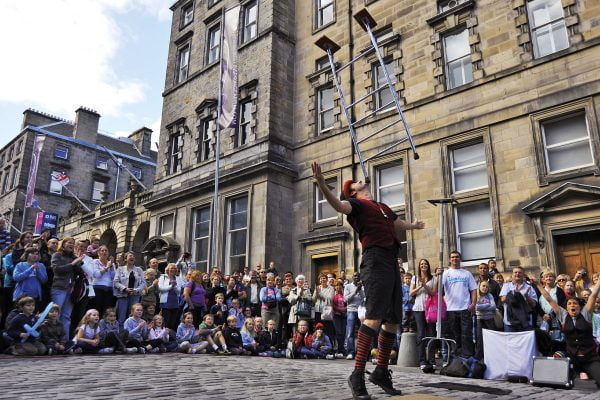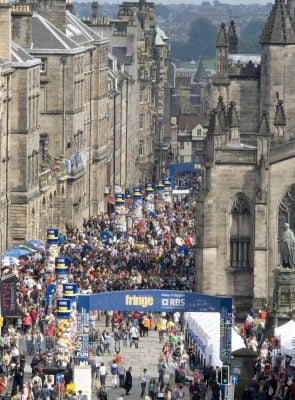In 1947, eight theatre companies refused to be excluded from the newly founded Edinburgh International Festival and continued their performances on the ‘fringe’ of the city.
Not having access to the city’s finest venues, Fringe performers were forced to get creative; they performed in pubs and church halls.
In these venues, they purposefully poked fun at the elitism and snobbery that the ruling class tied to culture. It is for this reason that comedy became a mainstay of the festival by the mid 1950s.
By the 1960s, the Edinburgh Fringe had become a melting pot of working class resistance.
From its origins, the Fringe has now grown into the world’s largest performing arts festival featuring in excess of 50,000 performers from 60 countries across 262 venues.
The festival now lasts 25 days in August and attracts over 700,000 tourists, selling over 2.6 million tickets.
Today, as any Fringe performer can attest to, the old inspiring story of the Fringe has become its opposite: the festival has become a living nightmare for performers and workers.
A Fringe for the rich
 Despite its explosive growth and the fact that the fringe brings in £1 billion to the UK economy every year, and over £200 million to Edinburgh specifically, none of these profits are seen by the working class.
Despite its explosive growth and the fact that the fringe brings in £1 billion to the UK economy every year, and over £200 million to Edinburgh specifically, none of these profits are seen by the working class.
In a city already facing a housing crisis, housing is acutely affected during August, with residents experiencing some of the highest rent inflation in the UK (see below).
For performers accommodation prices reach up to the dizzying heights of £1,125 per night, accompanied by surges in rail fares.
The dream of young performers getting their big break at the Fringe continues to crumble into dust. In 2022, performers lost an average of £1,000 over the course of the Fringe – a price many young working class talents are unable to afford.
Several student comedy troupes where huge names in British comedy got their start, such as the Durham Revue and Leeds Tealights, have said costs are so high that this Fringe may be their last.
This year’s Fringe brags of being “bigger and better” than ever. But as most workers know, this simply means more money for landlords.
A nightmare for locals
Adding insult to injury is the fact that, given rising ticket prices, many working class people cannot even attend the festival – defeating its original purpose as a cultural event.
Not content with just pricing out workers from attending, the capitalists make sure to squeeze as much value as they can out of the hospitality workers and students who use the month’s 6,000 temporary job openings to help pay their bills.
An estimated one in three workers were paid less than a living wage in the 2022 Fringe. Many volunteer workers are expected to work full-time, six days a week for a mere £500 in “expenses”.
This is the truth about the Fringe today.
View this post on Instagram
In reality, all of the wealth made in August is held by the capitalists and landlords who now run the show, while performers, workers and audiences foot the bill.
Far from being a period of “cultural upliftment” as the Edinburgh council likes to put it, the Fringe remains a nightmare for most workers and young people, who now avoid it like the plague.
Reclaiming the Fringe
However, all is not lost. In the convulsive period of class struggle ahead, we can only expect to see its expression in the arts – as we’ve seen the beginnings of at festivals such as Glastonbury this year.
In the words of Leon Trotsky:
“Generally speaking, art is an expression of man’s need for an harmonious and complete life, that is to say, his need for those major benefits of which a society of classes has deprived him.
“That is why a protest against reality, either conscious or unconscious, active or passive, optimistic or pessimistic, always forms part of a really creative piece of work. Every new tendency in art has begun with rebellion.”
As communists, we must raise these demands to artists, asking them to join our ranks and fight for true liberation of the arts, free from the profit motive and all the evils it brings.
Only through socialism can the artist be truly free. It is with this spirit, that we call upon anyone who agrees with us to join as we fight to reclaim the Fringe by throwing out the parasites, profiteers and the entire system that denies us our culture!
Infrastructure buckles beneath the Fringe
Andrew Brown
Each August, Edinburgh’s city infrastructure buckles beneath the weight of the Fringe, an annual display of capitalist excess.
 In 2024, bin‑collection strikes during the festival forced locals to confront overflowing streets, while council leaders treated the event as a cash cow – eager for revenue, and blind to the social costs.
In 2024, bin‑collection strikes during the festival forced locals to confront overflowing streets, while council leaders treated the event as a cash cow – eager for revenue, and blind to the social costs.
In 2025, this same pattern is repeating again.
Key thoroughfares are closed for weeks, diverting traffic and choking public transport. Tourism surges strain street cleanup services already undermined by staffing cuts, while rubbish collection falters amidst strike threats.
For residents, everyday life is suspended. Crowds make navigating the city centre a logistical nightmare. Rents soar as short‑let landlords evict tenants for higher-paying tourists (see below).
Bright lights, noise and crowds envelop neighbourhoods, depriving locals of peace and public spaces. Dumbiedykes residents have branded this noise as “mental torture,” and resorted to interrupting a council meeting after their complaints were continuously ignored:
“You haven’t actually represented the people in regards to this […] Big companies come from London to Edinburgh and make a lot of money that doesn’t benefit residents.”
Other residents are known to avoid central areas entirely, effectively locked out of their own city during the festival season.
Such disruption is no accident; it is the outcome of viewing culture as commodity, and residents as replaceable.
Hospitality and council workers, pushed into overtime shifts and late‑night routes, bear the physical burden without fair compensation. Meanwhile profits flow to Airbnb owners, hotels, and corporate sponsors.
As communists, we must expose how the Fringe infrastructure – the roads, bins, public transport – falls into the service of tourist profits, not community life. The struggle for culture must include the fight for the city: infrastructure controlled and planned for working class needs, not private pockets.
Time to go bigger than short-term lets
John Petherwick
 During the Fringe, private landlords are keen to cash in on this annual explosion of demand for accommodation. One bed apartments are listed for upwards of £8,000 for the month – pricing out the very artists that make the Fringe so popular.
During the Fringe, private landlords are keen to cash in on this annual explosion of demand for accommodation. One bed apartments are listed for upwards of £8,000 for the month – pricing out the very artists that make the Fringe so popular.
This lucrative short-term lettings industry has quickly been cornered by larger companies like Altido, who have over a hundred properties listed on Airbnb.
Housing which could otherwise be used for long term accommodation is instead used for businesses to rake in quick profits, carrying with it all the associated problems of gentrification and residents being priced out of neighbourhoods.
In 2022, with a blinkered vision, the Edinburgh council introduced a relatively stringent approach to licensing these short-term lets.
And despite the fat cat landlords’ dismay, a study by BiGGAR Economics suggested it had little effect on the affordability of housing beyond an initial deceptive decrease. As of May this year the annual inflation of house prices stood at 7.6%. Private rents at 3.3%.
I ask you comrades, if this was a simple matter of tweaking local planning policy, then why is almost every major city in the world facing the same problem of unaffordable housing?
The solution is a radical change. If we had democratic control over the construction companies, the developers and the banks, we could plan high quality housing and neighbourhoods for social good, not profit.
This is the only way we can ensure we have enough housing for everyone to live in – and to accommodate all those passing through!
Hospitality workers at BrewDog face the cut
Calum Macdonald
BrewDog – Scotland’s ‘punk’ brewers – have recently announced the sudden closure of ten of its ‘flagship’ bars in Scotland and England. Workers have been given just three days of notice.
Unite Hospitality slammed the move, asking: “In what universe is 3 DAYS a morally (or legally) acceptable notice period for a proper redundancy consultation?”. Unite has stated they are “supporting [their] members across these 10 sites to collectively challenge these redundancies”.
In March 2024, the cracks began to show when BrewDog rolled back wages from the national living wage to the minimum wage during a period of high inflation.
Around the same time, egg-head founder James Watt received backlash on social media after calling the UK a ‘workshy’ nation – from a beach in the Maldives!
This man has just made millions from thousands of bar workers grafting over Christmas and New Year on just above the minimum wage.
The same man who was sunning himself in the Maldives weeks before his company abandoned the real living wage. #JamesWatt has absolutely no… pic.twitter.com/YP7io2YCz7
— Unite Hospitality (@FairHospitality) January 15, 2025
Watt finally stepped down last year after further controversy with allegations of bullying, misconduct, and censure for green-washing advertisements.
Behind the scenes, they have been making losses in the millions since 2020 – not that this stopped the BrewDog bosses from filling up their pockets with the efforts of their workers who have now been hung out to dry.
BrewDog is a capitalist company, no matter its cringe ‘rebel’ branding. And it is operating in a declining economy; over a third of UK hospitality businesses are at risk of going under, with 69,000 hospitality jobs lost in the last eight months alone.
In the interest of short-term profits for shareholders, the first thing on the chopping block are workers wage, conditions, and jobs.
This year’s Fringe Festival is expected to draw yet more record crowds. An army of low-paid, highly exploited hospitality workers are supposed to serve the crowds while inflation soars, rents increase, and their jobs are cut at a whim with 3 days notice.
Solidarity to the BrewDog workers and to all hospitality workers!






